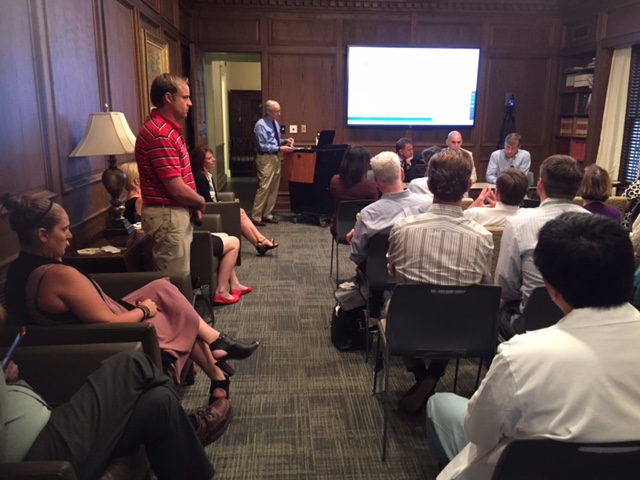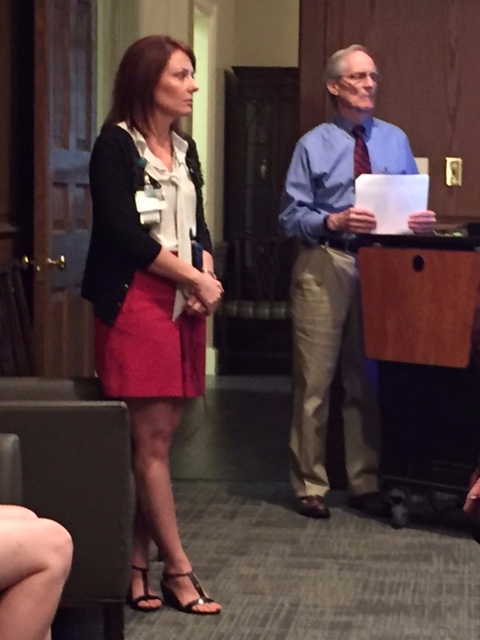The July CCTS Forum on “The Business of Clinical Trials: Who Pays? Who Profits?” drew a standing room only crowd despite a summer rainstorm that ended minutes before the presentation and panel discussion began.
Dr. Heather Hathorne, manager of the UAB Cystic Fibrosis Clinical Research Unit and the Child Health Research Satellite Unit (CHRU), kicked off the event with an overview of clinical trials: identifying all associated costs, developing a “fair and appropriate” budget, negotiating that budget with a sponsor, recovering costs throughout a trial’s lifecycle, and avoiding common pitfalls that can put a clinical trial in the red.

“The first thing you must know are your costs—indirects, patient care, personnel time (which has lots of hidden cost due to patient demands on the research team), study start-up, ‘invoiceable’ items, and study close out,” Hathorne said. Start-up fees, such as administering feasibility questionnaires, preparing for IRB review, preparing budgets and contracts, staff training, source document development, and site fees, fail to sometimes make it into a contract.
She also urged attendees to remember that “lack of enrollment does not equate to no cost—even studies that fail to enroll a single patient can incur significant start-up expenses.” She noted that her CF program start-up fees were approximate $19,000, “which we included on our letterhead as part of our trial fee schedule to be transparent with the sponsor prior to the start of negotiations.”
“Know your invoiceables!”
Hathorne advised budgeting for procedures that might happen as well those that would happen: screen fails, pregnancy tests, unscheduled visits, travel, overnight stays, IND safety reports, FDA audits. “It is important to account for these just in case,” she said, “because a CRO or sponsor will never offer you the amount of compensation you deserve, only the amount you negotiate.”
Time is money
Another area in which trials under budget is personnel time. Hourly rates are frequently underestimated, she said, because of fear a sponsor will walk away. But study visits can be complex and every visit should include billable PI time because they will have to review all notes even if they do not perform the physical exams. She encouraged using the Schedule of Events to identify the length of each visit, billable tests, whether there are both tech and professional costs associated with each test, the number of draws for a test, whether the lab used is central or local, and all personnel time involved. She urged a review of all footnotes for “hidden costs.”
Negotiation 101
Only when you have all of this data pulled together are you ready to negotiate, a process that should follow the same steps for every study:
- Know how far you can lower your charges without losing money
- Understand the concept of “fair market value”
- Establish a site-specific checklist
- Know when to walk away

“You negotiated the contract, you did the work, so COLLECT THE MONEY!” Hathorne said the average percentage of the budget that research sites do not collect is 26%. “Until OnCore is online, develop a system to help you track all charges and events, then submit invoices for all these items according to the time schedule outlined in your contract, and do not close your grant until you have received all payments” she advised. CCTS Director Dr. Robert Kimberly added that a new Yale study reported over 50% of “fair and appropriate” trial costs are not captured in budgets. By combining the two figures, "a trial stands to nearly double its income if the financial piece is done well," he noted.
Hathorne was joined by a panel of clinical trial experts, including Dr. Mansoor Saleh, Medical Director, UAB Clinical Trials Administration Office, and Director, CCTS/CCC Phase I Clinical Trial Unit; Dr. Steve Rowe, Director, Gregory Fleming James Cystic Fibrosis Research Center, and Co-Director, CCTS Child Health Research Unit; and Dr. Mark Dransfield, Professor, Division of Pulmonary, Allergy, and Critical Care, UAB Department of Medicine. All agreed that many investigators, especially those just starting out, “undervalue their studies and accept sponsor bids that are too low.”
Dr. Kimberly thanked the speakers and noted that improving the business side of clinical trials is ultimately about doing more for patients in a trial. He urged the conversation continue “as we prepare for the rollout of OnCore.” OnCore is an enterprise research system for clinical trial management.
In case you missed it, you can watch the July Forum video on our CCTS YouTube channel.